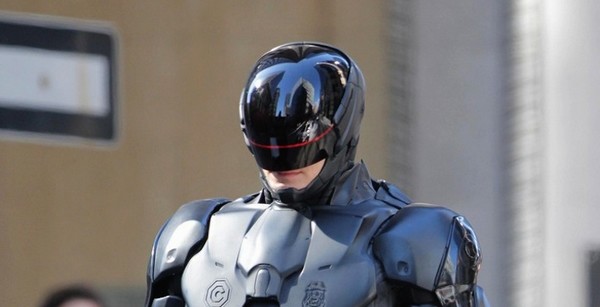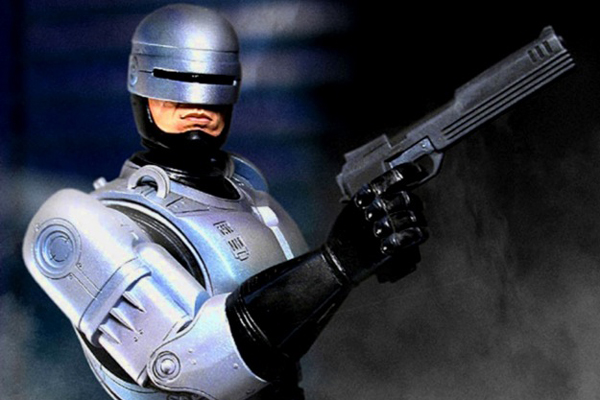Genre: Sci-fi
Premise: (from IMDB) In 2039 Detroit, when Alex Murphy – a loving husband, father and good cop – is critically injured in the line of duty, the multinational conglomerate OmniCorp sees their chance for a part-man, part-robot police officer.
About: This draft of Robocop was written by Joshua Zetumer. Zetumer sold his first script, Villain, to 2929 studios a few years ago. Although he started out writing big sprawling action films, Villain was the script that got him noticed, secured him an agent, and ultimately landed him a sale. The script impressed director Marc Forster enough that he asked Zetumer to rewrite Quantum of Solace. In fact, the script led to a whole host of large scale assignments, including the Leonardo DiCaprio project, The Infiltrator, and the remake of Dune. Zetumer cites Chinatown as the biggest influence on his work. Despite all the work Zetumer’s been doing since the Villain sale, Robocop will be his first feature credit, a strange byproduct of the Hollywood screenwriting system (when are they going to add an “employed writers” credit? They give a credit to the guy who cleans the director’s car for God’s sake). The director of Robocop, Jose Padilha, first broke on the scene with his chilling documentary, Bus 174, about a drug-crazed madman’s takeover of a Rio de Janeiro bus.
Writers: Joshua Zetumer (revisions by Nick Schenk)
Details: 126 pages – January 20th, 2012 draft (this is an earlier draft of the script and does not reflect the final film)
Like many people who saw the original Robocop as a child, my view of movies was forever changed. Okay, well, maybe it didn’t have THAT big of an effect on me, but it was a really cool movie. I mean, what kid didn’t want to be Robocop after seeing that suit? And then, of course, there was the violence. You see, back in the day we didn’t have “warnings” and parental movie-watchdog sites that told parents every little potential thing that could psychologically damage your child for the rest of his life. You just showed up at the movie and whatever you saw, you saw. So no one knew their kids would be watching a gang of criminals heartlessly tearing our hero to shreds for what seemed like ten minutes onscreen. By the time that showed up, it was too late to turn back.
Revisiting the film a few years ago, though, it was notably a lot cheesier than I remembered it. It was still good, don’t get me wrong. But with violence no longer being at the top of my “why I enjoy movies” list, I found the movie a little less engaging.
Now what this means for a remake, I don’t know. Usually when something’s being remade, you have a strong opinion on it. What! They’re remaking Psycho! F*ck that! Or: Oh hell no! They’re redoing The Wicker Man! That’s a classic! I hate you, world! — With Robocop, though, I don’t really feel anything. On the one hand, it makes sense to remake it. A robot cop kicking the asses of all the bad guys can still be a cool film. On the other, I don’t know if today’s audience cares. I’m reminded of the recent Total Recall remake, which had way better special effects and production value than the original, but ultimately felt like a vapid film. And I think it’s because Total Recall’s success was a product of its time, something I’m afraid may also be the case with Robocop. And these trailers of the film aren’t helping. They’re not bad. But to stand out from the pack with an effects-driven concept film, you gotta be better than “not bad.”
It’s the year 2039 and Officer Alex Murphy is Detroit’s top cop. But he’s fighting a battle he can’t win. Crime has gotten so bad in the city, most of the cops have given up and joined the bad guys. The worst bad guy of them all is Antoine Vallon, a crime lord who’s got most of Detroit in the palm of his hand, and it’s only a matter of time before he has the rest.
Meanwhile, a corporation named Omnicorp is the fastest rising company in the world. Their products are robotic drones that go into places like Iran and clear them out so that the U.S. army doesn’t have to. We can now fight wars without losing a single soldier. Pretty sweet. Omnicorp wants to use these drones as policemen in the U.S. but the U.S. is too litigious. If a robot-drone accidentally kills one person, Omnicorp will be sued up the ying-yang.
So someone in the company comes up with a nifty idea to FUSE a robot-drone with a person. This way, it’s still the person making the decisions. Bye-bye lawsuit. Now they just need their first volunteer. Except who’s going to volunteer to become half-robot? Well, turns out the decision’s made for our poor Alex Murphy, as Antoine shoots him up until he’s basically a stump.
Since becoming a robot-cop is the only way he’ll live, Alex’s wife agrees to the procedure, and we get Robocop! Unlike the original Robocop, however, he doesn’t go right to the streets. He trains in places like China and Iran. Why? Ya got me! A few years later, he comes back to Detroit and begins his career as the first Robocop. Things go well at first until Alex starts yearning to be with his family again, which results in a very personal journey that ends with him finding out the shocking truth about his transformation.
Robocop is obviously trying to make a statement about the world – about drones in particular. It’s a hot-button topic so I applaud Padilha for wanting to take it on in a Hollywood film. The thing is, it doesn’t fit. This is Robocop. We’re supposed to be in Detroit watching him kick ass, Robocop-style. So every time we’re in another country taking on terrorists or training, I’m sitting there going, “Uh, what’s going on right now?” I mean, yes, it does mirror the drone debate. We use drones in other countries and the next question is, will we use them here? But again, just from a pure story standpoint, I was confused as to why we were spending so much time away from Detroit. I mean, Robocop doesn’t start fighting crime until page 70! Not only was that late, but it meant the real story here (cleaning up Detroit) didn’t get started until page 80! Might explain why the script is 126 pages.
That leads to another plot point, the legalese of it all. In the script, a TON of attention is given to this idea that they can’t build a drone in the U.S. because of the legal implications of it killing someone. So someone comes up with the idea of fusing a drone with a person. That way the person still makes a mistake and they’re free of liability. The problem is, the reasoning is really flimsy and I mean, come on — you think just because a person’s in that suit that Omnicorp isn’t getting sued to the nines if it kills someone? Of course they are. Sometimes, as writers, we want something to work so badly that we over-explain it in hopes that the reader will eventually buy in. But if the idea is flawed from the get-go, it’s not going to work. And it didn’t work here.
A lot of you are probably wondering what the difference is between old Robocop and new Robocop. Well, Robocop goes through 4 stages as he trains over a few years (Robocop 1.0, 2.0, 3.0, and 4.0). So he’s got a lot of different looks. He also has a ‘social’ and ‘swat’ mode. Social mode looks nice and cuddly for the general public. But when he switches into swat mode, his suit darkens and he looks more like a badass motherf*cker. You’re also going to get a Robocop who can run as fast as a car and that has his own Robobike, which he can “fuse” into. Oh, and Robocop can dodge bullets!
I think I heard that the new Robocop is rated PG-13, which would make sense because they DON’T SHOW the big scene where Alex Murphy is shot up, deciding instead to skip over it. I was a little disappointed by this because THAT was the scene that made us care about Robocop so much. Anything you can do to create sympathy for our hero and hate for our bad guy is going to make us root for our protagonist more. So I’m not sure getting rid of the scene (which I’m thinking was done for PG-13 reasons) was a good idea. However, that scene’s absence does come back to the story in an interesting way, so I’ll give Zetumer and Padhila that.
Oh, and if they keep the ending of the script, a veritable war in the Detroit streets, and they execute it right, that right there might be worth the price of admission. While a lot of Robocop was by-the-numbers, the final climax showed so much promise. It’s Robocop versus those huge AT-AT Walker things from the original Robocop. I’ll buy that for a dollar.
But yeah, while I admire this script for being ambitious and tackling a big debate (drones), I think that actually hurt the script. You guys know I like focus in my movies, and the international stuff always seemed to unfocus the script. We were all over the place. I mean at one point Robocop is fighting Al-Queda in the Middle East. What?? I don’t know if Padhila could’ve explored the drone stuff by only staying in Detroit. But it would’ve made for a better more focused film in my opinion. Still, Zetumer does a decent job with what he’s asked to do, and since Justin Bieber is executed in this script (yes, you read that right – well sort of anyway), that’s going to tip the scales to a “worth the read.” Sorry Biebs.
[ ] what the hell did I just read?
[ ] wasn’t for me
[x] worth the read
[ ] impressive
[ ] genius
What I learned: Action-ize boring scenes. There are certain perfunctory scenes in your script that you must write. They’re required by the story. But don’t think they have to stay perfunctory. Look for ways to throw a wrench into the scene, a surprise if you will, that’ll force your hero to act. In other words, action-ize the scene. In the middle of the script, Robocop needs to be introduced to Detroit by the mayor. This is potentially a straight-forward scene. The mayor introduces Robocop. Long boring speech. A reaction from the audience. Scene over. Instead, however, Zetumer introduces a criminal in the audience. Robocop immediately switches to SWAT MODE and must take the criminal down. In other words, don’t be afraid to break open traditionally boring scenes and turn them into something exciting.



